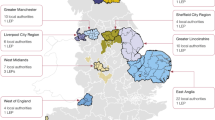
Overview
- Considers depoliticisation from a comparative perspective, particularly focusing on cases from continental European countries
- Investigates how depoliticisation is received by those at which it is aimed, as well as how it is put in to practice
- Promotes an interdisciplinary conversation to define depoliticisation as a dynamic and interactive process between government elites and societal groups/movements
Access this book
Tax calculation will be finalised at checkout
Other ways to access
About this book
This book investigates the extent to which depoliticisation strategies, used to disguise the political character of decision-making, have become the established mode of governance within societies. Increasingly, commentators suggest that the dominance of depoliticisation is leading to a crisis of representative democracy or even the end of politics, but is this really true? This book examines the circumstances under which depoliticisation techniques can be challenged, whether such resistance is successful and how we might understand this process. It addresses these questions by adopting a novel comparative and interdisciplinary perspective. Scholars from a range of European countries scrutinise the contingent nature of depoliticisation through a collection of case studies, including: economic policy; transport; the environment; housing; urban politics; and government corruption. The book will be appeal to academics and students across the fields of politics, sociology, urban geography, philosophy and public policy.
Similar content being viewed by others
Keywords
- Depoliticisation in Europe
- Representative democracy
- Anti-Politics in Europe
- Post-Politics
- European governance
- Party Identification
- Public Administration
- European public policy
- Depoliticisation strategies
- comparative European politics
- crisis of democracy
- depoliticisation techniques
- politics and urban studies
- depoliticisation in Bulgaria
- depoliticisation in London
- politics of the Heathrow third runway
- depoliticisation in Portugal
- depoliticisation in Cyprus
- depoliticisation in Hungary
- city planning and politics
Table of contents (10 chapters)
-
Front Matter
-
Back Matter
Editors and Affiliations
About the editors
Jim Buller is Senior Lecturer of Politics at the University of York, UK. He is a member of the British Political Studies Association (PSA) Anti-Politics and Depoliticisation Specialist Group.
Pınar E. Dönmez is Research Fellow at the Center For Policy Studies, Central European University, Hungary. She is a member PSA Anti-Politics and Depoliticisation Specialist Group.
Adam Standring is a PhD candidate in Political Science at the Universidade Nova de Lisboa, Portugal. He is a convenor and membership coordinator of the PSA Anti-Politics and Depoliticisation Specialist Group.
Matt Wood is Lecturer in Politics and Deputy Director of the Sir Bernard Crick Centre for the Public Understanding of Politics (Crick Centre) at the University of Sheffield, UK. He has previously worked in local journalism and lobbying, and has held visiting fellowship positions at the UK Cabinet Office and ANZSOG Institute for Governance, University of Canberra.Bibliographic Information
Book Title: Comparing Strategies of (De)Politicisation in Europe
Book Subtitle: Governance, Resistance and Anti-politics
Editors: Jim Buller, Pınar E. Dönmez, Adam Standring, Matthew Wood
DOI: https://doi.org/10.1007/978-3-319-64236-9
Publisher: Palgrave Macmillan Cham
eBook Packages: Political Science and International Studies, Political Science and International Studies (R0)
Copyright Information: The Editor(s) (if applicable) and The Author(s) 2019
Hardcover ISBN: 978-3-319-64235-2Published: 16 July 2018
Softcover ISBN: 978-3-030-09712-7Published: 15 December 2018
eBook ISBN: 978-3-319-64236-9Published: 03 July 2018
Edition Number: 1
Number of Pages: IX, 265
Number of Illustrations: 4 b/w illustrations
Topics: European Politics, Governance and Government, Urban Studies/Sociology, International Political Economy, Public Policy



